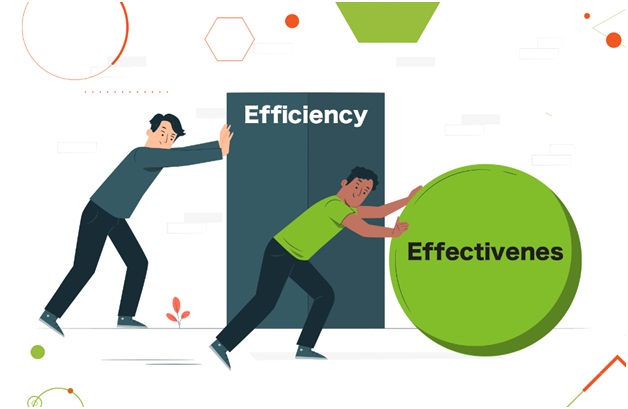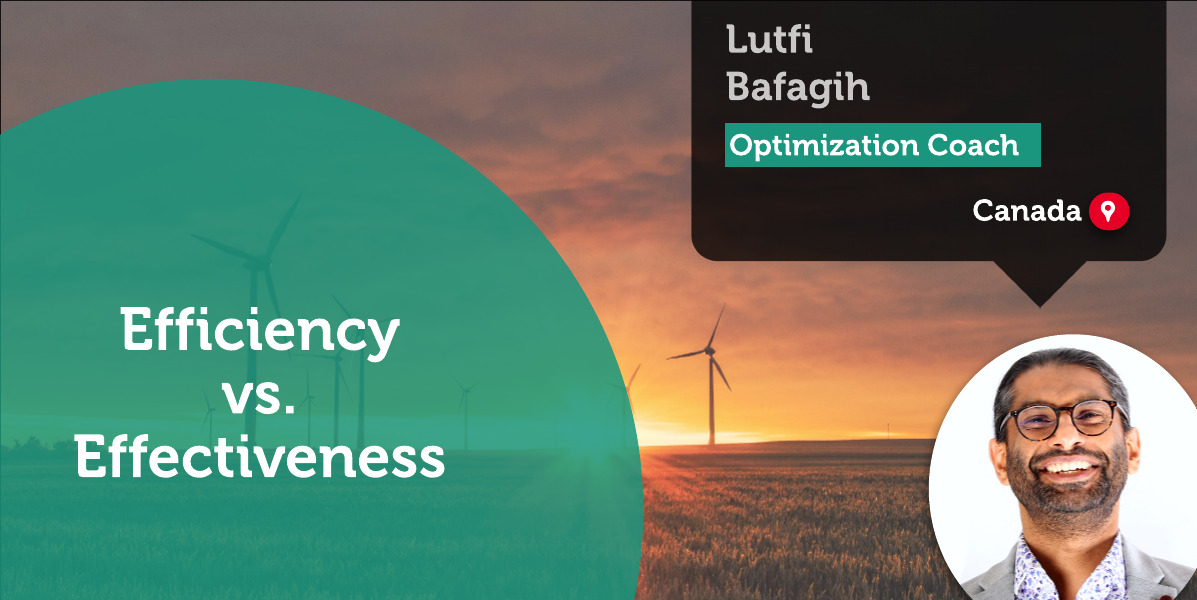A Coaching Power Tool By David Peterson, Optimization Coach, CANADA
How to Use Efficiency vs. Effectiveness

The principal driving forces for optimization of efficiency are savings in the following areas: time, money, energy, and resources. These savings are achieved primarily through a process of efficiency, the more efficient, the greater the savings.
Although the driving forces are the same, the process of achieving them is not an accurate definition of optimization, as most people and organizations use the method of optimization for efficiency.
Efficiency is excellent for machines and businesses, but it’s damaging for people. Machines need to be efficient, but people don’t! One of the biggest problems with efficiency is it limits people from experiencing the best parts of their job and life. When people are constantly busy, they’re more stressed and less likely to have time for themselves, and they feel exhausted and unable to think. After the quick wins that efficiency delivered wear off, people end up feeling overwhelmed and unproductive with zero energy for anything else. Organizations need to be efficient; however, more significant results can be achieved when the focus is on effectiveness. This avoids exhaustion and burnout and generates longer-term wins for both the employees and the organizations.
Most manufacturing and service organizations use highly efficient workflows to increase efficiency in their staff. This eventually results in their employees feeling like they’re being used as tools to do a job, creating the feeling of being treated unfairly and not valued, generating dissatisfaction and underlying discontent that tends to influence the work environment.
This efficiency-driven mindset permeating worldwide is creating an environment of unsatisfied, unfulfilled, and unmotivated individuals who are not as productive as they could be due to an efficiency mindset instead of an effectiveness mindset.
Optimization is about effectiveness, not efficiency. Through the actual lens of optimization, efficiency results from its effectiveness.
Efficiency vs. effectiveness is similar to mindsets. They both have the power to transform a person or organization; however, efficiency is focused on reductions, with effectiveness providing a holistic approach to growth and development.
Efficiency vs. Effectiveness: The Two Mindsets
Optimization is a crucial concept in today’s world. For a long time, the focus on efficiency was driving in the opposite direction of effectiveness. The true impact of optimization is gained as a result of growth.
Effectiveness is about improvements by pursuing higher levels of growth.
People often think about optimizing with the mindset of efficiency instead of effectiveness. These two mindsets can be identified as follows:
- Efficiency Mindset: A focus on reduction, making things cost less or consume less, a reductionist mindset.
- Effectiveness Mindset: A focus on growth, creating more through stewardship of growth.
Many individuals and companies get stuck in the mindset of efficiency. They focus on the output, the numbers, and the quantity of the reduction are all that matter. Then, they wait for their bottom line numbers to improve before embarking on another round of improvements. In this case, they are optimizing the efficiency of their workflow and actions.
In an efficiency mindset, one learns to improve or solve something existing. Whereas in an effectiveness mindset, one learns how to think and create the time and space to solve for the purpose of growth. It is not a failure-to-learn mindset. It is a failure-to-think mindset.
- A failure to learn means that people are not analyzing the process of their work and what’s going wrong with it, and they don’t have a plan to fix it.
- A failure to think means that people don’t have enough time in their day to think, as they’re occupied or busy with other things.
A growth mindset is one of the most powerful tools in an individual’s arsenal of strengths. It can help them with almost anything and can be a tremendous driving force behind everything they do. When someone has a reductionist mindset, they are constantly trying to do more, driven by a fear of missing out on a loss. Fear holds us back; fear creates limitations; fear freezes our minds and inhibits creativity. Having a “growth mindset” means opening yourself up to possibilities; possibilities develop new channels for growth towards achieving goals and finding strategies for improvement. Having a growth mindset means people can improve the value of something that has meaning for them in life, work, and relationships.
Rather than individuals looking to improve efficiency, they should shift towards effectiveness to create a more significant impact.
One way to implement a growth mindset into our daily activities is to ask ourselves how it can be an opportunity for us to be more effective before we begin a new task, helping us build a mentality of being constantly effective with our time, money, and energy resources. It’s all about developing a growth mindset of effectiveness, which can be very powerful. Organizations must foster a system that recognizes and rewards effectiveness.
The Value of Effectiveness vs. Efficiency
What Is the Difference Between the Efficiency and Effectiveness Mindset?
The efficiency mindset is about refining your abilities to do the same thing using fewer resources than you currently do, creating an indirect gain in the use of resources. Efficiency is about doing the most with the least.
Effectiveness is about doing it in the most effective way possible. Effectiveness is about finding a way to do something that gets the best results, including growth. It is about improving the ability to expand and grow.
We all know that the best way to get things done is to focus on what we’re doing. Using the right tool for the job: efficiency or effectiveness makes all the difference.
Value of efficiency:
- When we need an efficient process or system to make the most of our resources and outcomes.
- When we need to reduce our consumption of time and or money.
Value of effectiveness:
- When we need a vision for what we want to achieve and create a plan to get there.
- When we need to set clear goals and objectives and have enough resources to achieve them.
- When we need to be more effective with our time and money.
That’s how we can easily distinguish between efficiency and effectiveness. But remember, one does not always equal the other. Efficiency does not always equal effectiveness in the same way that effectiveness does not always equal efficiency in the same way.
For example, when we look at companies that manufacture phones, if we were to ask which company is the most effective at making phones?
Only one company comes to mind, and it’s not because they are not efficient. They are probably the most efficient in their manufacturing process, but that efficiency resulted from them aiming to be the most effective in creating and providing value.
People and organizations that focus on creating value have a growth mindset, and the more effective they are, the more value they generate for themselves and others.
The Power of Effectiveness as a Motivator
Effectiveness is a powerful motivator that also helps us progress. When we can recognize the potential impact of being effective in any sphere of our lives, It gets us excited about what we’re achieving and what can be achieved next. It’s the hidden, motivating power of effectiveness.
How Do We Build on This?
We begin by recognizing that we each have unique talents that sets us apart from the rest:
- We each have something special when it comes to empathy – this is true of all humans, regardless of culture or religion.
- We each have deep knowledge, skills, and talent in specific fields – this is true across all areas, whether scientific or artistic.
In addition:
- We need to recognize that we each excel when we work at building on our strengths.
- Most importantly, we need more than one skill set in order to be effective.
- We must develop our strengths and abilities over time by staying focused on our areas of expertise.
- We must learn from those that are the most effective in using the skills and talents we are also trying to master.
- We recognize that we create more space for further growth and development for ourselves and others as we grow.
How Will Effectiveness Motivate Us to Be Our Best?
Effectiveness is one of the most important skills we can acquire. Without it, we can drive ourselves into exhaustion, but if we can implement effectiveness in our daily thoughts and habits, we can enjoy the most rewarding of lifestyles with it. Effectiveness is the number-one trait that separates the successful from the unsuccessful in the business world. Like most effective people, effective companies tend to earn more, which is why they are successful. The most effective business people understand better than anyone else how to create value in the world around them. They know what it takes to be effective, making it part of their daily routine.
How do we become more effective? Let’s list some simple things we can do to be more effective. First, learn to prioritize; work on the task that produces the most value. Another tip is to get rid of distractions to create an environment of creativity and focus.
Creativity is one of the most critical things in the world. It is the driving force behind human development and many practical innovations, whether technological or scientific. Without creativity, there would be no stone age nor any modern technology. Creativity drives humans to constantly seek ways to generate new value by improving our lives. It is essential to be creative in everything we do to improve the value we produce in the world around us.
As we see our successes, we will be motivated by knowing that our strengths enable us to increase and grow our value to be productive for ourselves, our communities, and our world.
By doing this, we will find ourselves— as part of an effective team — these skills will help create the right environment for greater effectiveness and strong teamwork.
The Mindset of Effectiveness
It’s essential to think about our mindsets’ and the results they yield so that we can understand ourselves and more effectively help those around us.
We, as humans, have developed a strong desire to make a difference, which creates a drive to improve our situations. This drive motivates us to be effective in all that we do, whether it be in our personal or professional lives. This drive also compels us to act in a way that creates the most value and motivates us to improve upon what we’ve already created.
In their search for optimal performance, organizations must ensure that their systems are not merely efficient but are effective in creating value for themselves, their teams, and various stakeholders. With effectiveness, we all succeed, including our habitat!
References
